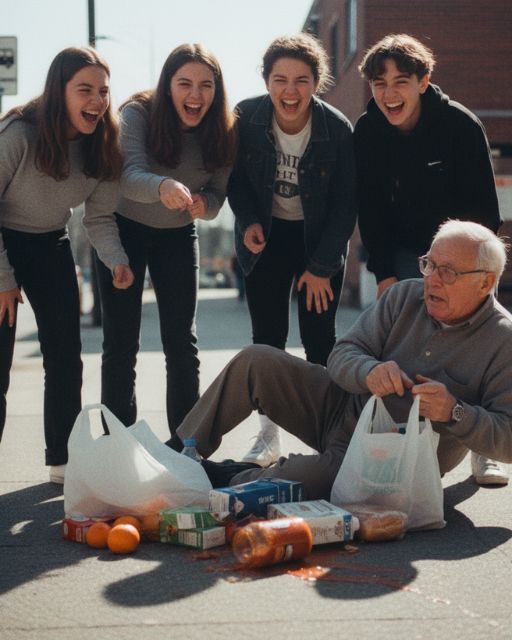At first, neither did I. I stood frozen, watching the scene unravel. Then something inside me shifted. Without thinking, I walked directly toward the group. One girl smirked at me, expecting me to join their mockery. Instead, I looked at them and asked, “What the hell is wrong with you?”
The laughter faltered. The boy with his finger still pointing tried to brush it off. “Relax, it’s just a fall.”
“Just a fall?” I snapped, louder than I intended. “That man could’ve broken a hip. He’s someone’s father, someone’s grandfather. Is this funny to you?”
They stared blankly. One girl shifted uncomfortably, but none apologized, none moved to help. Their lack of remorse stung. I turned away from them and crouched beside the older man.
“Sir, are you okay?” I asked gently.
He winced but nodded. “Just embarrassed more than anything.”
I helped him sit upright. Another passerby, a young woman, rushed over and together we gathered the groceries—rescued tomatoes from rolling under cars, salvaged a bag of flour before someone stepped on it. We returned everything to his arms. He introduced himself as Mr. Hampton, living just three blocks away in a small brick house with wind chimes on the porch and a cat lounging on the steps.
“I don’t usually need help,” he muttered as we walked him home slowly.
“I know,” I said. “But everyone needs a hand sometimes.”
He smiled faintly. That alone made the moment worth it. Still, I couldn’t shake the image of the teens’ faces. Their laughter gnawed at me. That night, I wrote about it in my community group—not to name and shame, but to highlight that this behavior isn’t acceptable. To my surprise, the post blew up. Hundreds commented—most supportive, some outraged. A few cut to the heart of it: “This is what happens when kids aren’t taught empathy.”
That line stuck.
Because I worked at a library, surrounded by teens every day. Most were kind, thoughtful, curious. Not all of them were like those kids at the bus stop. But clearly, some were missing guidance. If no one steps in, how do they learn differently?
So I pitched an idea to my manager: a new kind of event, not a book club or a movie night. Something raw. Real. We called it “Open Mic—Real Stories That Changed Me.”
On the first night, a handful of teens showed up. Among them was one of the boys from the bus stop. The one who laughed the loudest. He didn’t recognize me. That was fine.
I started by telling my story. The fall. The laughter. My decision to speak up. The room went silent. Then one girl admitted she once laughed at a classmate who tripped, and the memory still haunted her. Another shared her own regrets. Soon, they all began opening up. Mistakes, remorse, lessons learned.
The boy, whose name I later learned was Sam, sat quietly through those first sessions. He didn’t speak until weeks later when he lingered after the group ended. “That old man in your story,” he whispered. “That was me. I was there.”
I nodded.
“I didn’t think it mattered,” he admitted. “I don’t know why we laughed. I guess it felt easier than caring.”
That sentence hit me hard. It revealed what I suspected—his cruelty hadn’t come from malice but from fear. Fear of looking soft, fear of being different.
Over time, Sam started volunteering at the library. He shelved books, helped seniors with technology, ran small programs for kids. He didn’t do it for credit. He just kept showing up.
Then one Saturday, Mr. Hampton walked into the library. My jaw dropped. Sam froze when he saw him. For a long moment, I thought Sam would bolt. But instead, he walked up and said, “I’m sorry, sir. For that day.”
Mr. Hampton studied him, then nodded slowly. “Takes guts to admit that. Most people pretend it never happened.”
That conversation changed everything. Soon after, I saw the same group of teens at the park near the bus stop. But instead of mocking, they were handing out water bottles to people at the shelter. One even held a sign that read, “Need a smile? We got one.”
Months later, the library’s “Truth Talks” had become a weekly staple. Teachers sent their students. We even got funding to expand it into a youth outreach hub. Sam graduated that spring. In his speech, he talked about kindness—not as something easy or popular, but as something necessary.
And a year later, at that same bus stop, I watched a woman slip on the curb. Before I could move, three teens rushed to help her gather her things. None of them laughed. One looked at me and said, “People fall. We help, right?”
That’s when I realized the ripple had spread. Kindness had taken root. All because someone spoke up.
Sometimes, all it takes is one voice. One story. One choice to care.

